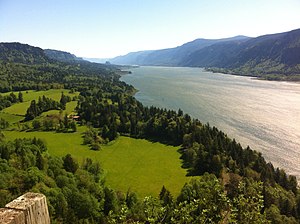Cascada
| Cascada | |
 Flag | |
| Country | |
| Theme | |
| Capital | Iğméria |
| Largest City | Saar-Silverda |
| Population | 30,482,684 |
| Prime Executive | Viridius K.S.T. Antrianon |
| Chancellor | Lárentius O.D.L. Eraston (APC) |
| Stanora seats | 3 |
| Official languages | West Coast Marine Coscivian Serradan Coscivian Kiravic Coscivian |
| Postal Abbreviation | KSK |
Cascada, officially the Republic of Cascada (Kiravic: Kéarita Kaskada) is a state of the Kiravian Federacy located on the western coast of Great Kirav. It is the Federacy's sixth-largest state and fourth-largest mainland state in terms of population, and the third-largest in terms of gross domestic product. As the heartland of the Kiravian West Coast, Cascada wields enormous political, economic, and cultural influence across the Federacy, and is noted for its contributions to Kiravian technology, music, literature, and cuisine.
Geography
Cascada has a mostly temperate oceanic climate, with some coastal areas and offshore islands experiencing hyperoceanic conditions. The state straddles the mesotemperate and supratemperate thermal belts west of the Coast Ranges, and the thermo-submediterranean and supra-submediterranean thermal belts east of the coast ranges.
Economy
Cascada has a large and highly diversified economy driven by information technology, scientific research, finance and insurance, agriculture, offshore natural gas extraction, high-tech manufacturing, and international commerce. Saar-Silverda is the Federacy's largest cargo port by volume and the main port of entry for goods imported to Great Kirav from the Federacy's overseas posessions.
Cascada is home to the majority of Kiravia's west coast technology corridor, both in terms of geographic area, information technology revenues, and information technology patents. Cascada has registered more patents across all categories annually than any other state since 21168, reflecting a strong penchant for innovation.
Despite its strong tertiary and quaternary sectors, extractive industries remain important to the Cascadan economy. Early migrants to Cascada were drawn by the state's large platinum and silver deposits, and the state's mountain ranges remain major areas for the production of ferroalloys, manganese, and tungsten. Offshore natural gas deposits are a major source of revenue for the state.
Politics & Governance

Cascada is a semi-presidential republic administered by a Cabinet responsible to both the Prime Executive of Cascada (also referred to as the Governor) and the Cascadan Congress. Congress comprises an Auditorium, elected triennially by single transferable vote in each of the state's XX countyships, and a Representative Assembly, elected annually and at-large by mixed-member proportional representation. The Prime Executive of Cascada is elected every five years by alternative vote.
Subordinate to the politically-appointed Cabinet, the institutional government acts as a relatively autonomous centre of political authority in its own sphere as it carries out the day-to-day operations of the state. The Prime Executive sets the overall direction of policy, while Congress acts in a supervisory capacity to ensure accountability and public trust in the government, and is empowered to dismiss the government or trigger a recall election for the Prime Executive.

Cascada is rated as a 'competitive' state by the Institute for Republican Health, citing its dynamic multiparty system, high voter turnout and information, frequent referenda, and recallable governorship. There are a large number of political parties representing a wide range of political patforms active in Cascada, many of them undergoing schisms and mergers between election cycles. However, on the Federal level, Cascadan voting habits are more predictable: As the leading beneficiary of the post-Kirosocialist economic boom and economically liberal policies, Cascada consistently elects delegates to the Stanora who sit with the Federalist Republican Alliance caucus. Prime Executives Kólsylvar, Rénkédar, Mérovin, and Candrin, all of whom were associated with the SRA and involved in the SRA-led National Renewal Movement, all took Cascada's electoral votes by landslide margins.
Local government
Local governance in Cascada is the responsibility of the 97 countyships into which the state's territory is divided, and of incorporated municipalities. Municipalities may be sar (translatable as both "city" and "town") - either óvsiáldasar (general-law city) or ---sar (charter-city).
Society & Culture
The population of Cascada is as diverse as it is large, reflecting a long history of migration to the state from all parts of the Kiravian Federacy and the wider Coscivian world over the past century, as well as some more recent immigration from the non-Coscivian countries of Ixnay and elsewhere.
Religion
Religion plays an important role in the lives of most Cascadans. The largest religious affiliations reported in the state are Roman Catholic, Coscivian Orthodox, Rurican, Komarist, Insular Apostolic, and Eastern Orthodox. The northern third of the deeply and uniformly Catholic Rosary Belt is situated in Cascada, and the state is home to many important Catholic institutions which have been important to its history. Nonetheless, due to constant immigration from other parts of the Federacy and beyond, and significant contact with Crona and elsewhere, Cascada's religious demography is much more diverse and complex than that of neighbouring Ilfenóra, where the Rosary Belt's influence is more pronounced. Many Cascadans, particularly in urban areas, practice religious syncretism, not only between Christianity and Coscivian religions as is common throughout the Federacy, but also with other faiths and belief systems such as the Islam, Jainism and Sikhism introduced by the Indo-Tatarystani minority and a number of "new religious movements". Cascadans are known for having a very universalistic approach to religion, and universalistic monotheism is even more prevalent and much stronger as a community norm than in the Federacy at large.
Due to its proximity to Rototornik and trade ties with Monavia and Slakonian, Cascada has a large Eastern Orthodox presence. The Rhūnik people follow Arctic Orthodoxy. Non-apostolic Christianity has a significant presence in the state, owing to its proximity to Crona. Prolonged contact with Crona has resulted in the formation of Lutheran, Mormon, other Protestant, and heterodox Christian congregations in the state. The Lutheran Church of Kiravia is headquartered in Saar-Hurivilnum, and the smaller Confessional Lutheran Church and Neo-Orthodox and Palæo-Orthodox Lutheran Churches are based elsewhere in the Saar-Silverda-Saar-Hurivilnum Metropolitan Area. The post-Protestant Emerging Church movement has a very visible and growing presence in urban areas. The official churches of many foreign countries have established congregations in and around key ports, including Erikkan Christians, Scandinavan Catholics, Hekuvian Catholics, and Astarese Orthodox.
Cities

| Rank | Countyship | Pop. | |||
|---|---|---|---|---|---|
 Saar-Silverda  Saar-Hūrivilnum |
1 | Saar-Silverda | Silverda | 15,312,000 |  Saar-Kélafora  Kryvōma |
| 2 | Saar-Hūrivilnum | Asomarlin | 4,312,000 | ||
| 3 | Saar-Kélafora | Salernon | 14,205,000 | ||
| 4 | Kryvōma | Iritusca | 12,311,000 | ||
| 5 | Polybiopolis | Keller | 17,175,000 | ||
| 6 | Anonymopolis | Itrotobun | 15,624,892 | ||
| 7 | Rack City | Xula | 14,405,650 | ||
| 8 | Boźyer City | Turnpike | 12,137,780 | ||
| 9 | Cascada City | Róisín | 10,350,120 | ||
| 10 | Iɣméria | Kiskoma | 9,710,600 |